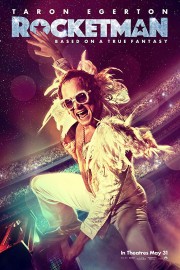Rocketman
I didn’t expect to feel like Dexter Fletcher’s “Rocketman” was a movie I needed to see in this moment of time, but dammit, it kind of was. The way Fletcher and writer Lee Hall have told the story of Elton John from his early days to the time he went to rehab, and has remained sober for nearly three decades since, is fairly predictable in terms of the narrative it presents, but it’s done with such energy and heart that you cannot help but get sucked in. If not, there’s the music to push you the rest of the over into this film’s corner.
Though I love music dearly, and it led me to what I’m doing now, Elton John and other classic artists have not really been in my rotation, unless a song hit me through a movie soundtrack. That John is still around to tell his story through Fletcher, Hall and star Taron Egerton means we’ll get something relatively close to the facts, and I certainly think John has allowed them to do that. Sir Elton is not a sanitized hero in this but a person whose addiction to alcohol and drugs leads him down several spirals, including a near-drowning in his pool, but it also plays loose with reality when it comes to the music. There’s a scene at his first concert at L.A.’s The Troubadour where he is singing, and suddenly, everyone is floating above the floor. Of course that didn’t happen, but I have no doubt it felt like that for John during his first show, and the audience was in love with what they were hearing. It captures the emotional reality of the moment, and that’s how the music operates at every beat in this film. “Rocketman” is as much an honest-to-goodness musical as it is a biopic, and it makes the movie thrillingly alive.
Fletcher was the director brought on to complete “Bohemian Rhapsody” after Bryan Singer was fired, and it’s easy to see why he was Fox’s choice. The two films tell fundamentally similar narratives about two rock legends, how the lifestyle of rock sucked them down into an abyss of sex, drugs and alcohol that pushes them to the brink of death, and pushes the people closest to them away. “Rocketman” is far and away the better film about this story, and not just because “Bohemian Rhapsody” felt like a slap in the face to the memory of Freddie Mercury by the remaining members of Queen; “Bohemian Rhapsody” is dull in its structure and visual language whereas “Rocketman” plays like a music video with a narrative. It doesn’t just name-check greatest hits but uses those songs to get to the emotional truths playing out at that time of the story; this results in some revisionist history in terms of songs being played at specific moments where they couldn’t have, but it gets to John’s emotional truth when it does this, and the results are beautiful musical storytelling.
Taron Egerton is fantastic as Sir Elton John. We first see him in a flamboyant devil’s costume; he has left a gig to immediately check himself into rehab. That is the framing device in which he will tell his story: his turbulent upbringing with his mother (Bryce Dallas Howard, who is fine, even when she has to endure some of the worst old-age makeup I’ve seen in years) and father (Steven Mackintosh); his first times playing the piano, leading to a scholarship opportunity at the Royal Academy of Music; the beginnings of his collaboration with lyricist Bernie Taupin (Jamie Bell, who is terrific); his early success in L.A. and climbing of the charts; his relationship with his personal manager, John Reid (Richard Madden, who is sleazy and not to be trusted from the second he gets on-screen, which is not really a good thing, and honestly one of the easiest beats this film plays); and his downward spiral that eventually led him to rehab in 1990, after which, his life transitioned to one of real happiness. There are very familiar tropes that play out, but they do so with such a degree of heart and purpose that it’s hard to fault the filmmakers for hitting them. This is how biopics should be done; “Rocketman” is one that soars.










